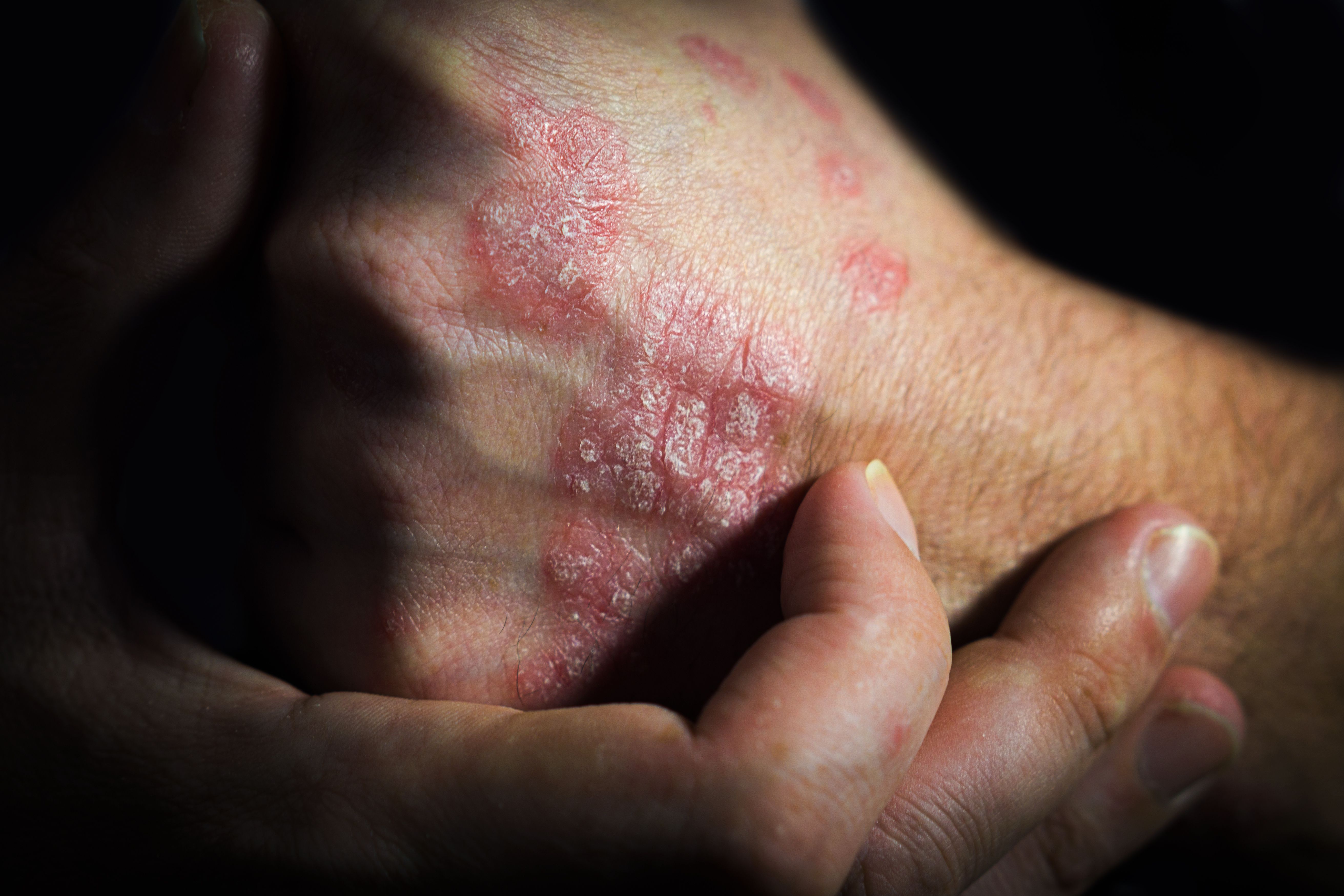- Acne
- Actinic Keratosis
- Aesthetics
- Alopecia
- Atopic Dermatitis
- Buy-and-Bill
- COVID-19
- Case-Based Roundtable
- Chronic Hand Eczema
- Chronic Spontaneous Urticaria
- Drug Watch
- Eczema
- General Dermatology
- Hidradenitis Suppurativa
- Melasma
- NP and PA
- Pediatric Dermatology
- Pigmentary Disorders
- Practice Management
- Precision Medicine and Biologics
- Prurigo Nodularis
- Psoriasis
- Psoriatic Arthritis
- Rare Disease
- Rosacea
- Skin Cancer
- Vitiligo
- Wound Care
News
Article
Deucravacitinib Shows Promise as Oral Psoriasis Treatment
Author(s):
Phase 3 trials found the treatment demonstrated efficacy as early as week 1 of treatment and sustained this response through week 52.
Image Credit: © SergeVo - stock.adobe.com

A recent analysis investigated data from 2 multinational, year-long trials (POETYK PSO-1 and PSO-2) involving patients with moderate to severe plaque psoriasis.1,2 Participants were randomly assigned 1:2:1 to take placebo, deucravacitinib (Sotyktu; Bristol Myers Squibb) 6 mg daily, or apremilast 30 mg twice daily. Researchers behind the analysis focused on evaluating the effectiveness and maintenance of response with deucravacitinib, stating it could be a “valuable oral treatment option for the long-term management of patients with moderate to severe plaque psoriasis.”3
Measuring Onset of Action
Speed of onset during the placebo-controlled period was measured at weeks 1, 2, 4, 8, 12, and 16 using:
- Changes from baseline in mean values of the continuous measures of the Psoriasis Area and Severity Index (PASI), body surface area (BSA), BSA × Static Physician's Global Assessment (sPGA) (a composite outcome that considers both BSA involvement and overall disease severity)
- Psoriasis Symptoms and Signs Diary (PSSD) symptom score, and the Dermatology Life Quality Index (DLQI)
- Achievement of the binary responses for PASI 75
- 90% reduction from baseline in PASI (PASI 90)
- 100% reduction from baseline in PASI (PASI 100)
- sPGA 0/1
- sPGA 0
Results
A total of 1264 patients were included in the analysis (POETYK PSO-1: 166 randomly assigned to placebo, 332 to deucravacitinib; POETYK PSO-2: 255 randomly assigned to placebo, 511 to deucravacitinib). According to the analysis, baseline patient demographics and disease characteristics were similar across the deucravacitinib and placebo groups in both trials and were “representative of a population with moderate to severe plaque psoriasis.”
Researchers wrote that deucravacitinib showed rapid and “significant” improvements in psoriasis symptoms compared to placebo in clinical trials. By Week 1, they noted it achieved a significantly higher reduction in PASI compared to placebo in both POETYK PSO-1 (-14.6% vs. -5.7%, p < 0.0001) and POETYK PSO-2 (-14.1% vs. -8.3%, p < 0.001). By Week 4, approximately 40% mean improvement from baseline in PASI was consistently observed with deucravacitinib. Additionally, the analysis states that improvements in BSA involvement were significant by Week 2 (POETYK PSO-1: -1.9% vs. -0.3%, p < 0.01; POETYK PSO-2: -2.9% vs. -1.4%, p < 0.01).
Throughout the study, researchers wrote that all key efficacy outcomes, including patient-reported symptoms and quality of life, showed “significant” improvements within the first 8 weeks of deucravacitinib treatment, with most improvements seen by Week 4. More patients treated with deucravacitinib achieved PASI 75 and sPGA 0/1 as early as Week 4 in both trials, demonstrating to the researchers its effectiveness early in the treatment course.
The analysis stated that patients in POETYK PSO-1 who consistently took deucravacitinib from the start maintained high rates of skin improvement over 52 weeks. By Week 24, 69.3% achieved at least a 75% reduction in PASI score, and 58.7% reached sPGA 1/0. These rates reportedly stayed stable through Week 52, with 65.1% still achieving PASI 75 and 52.7% maintaining sPGA 0/1. Researchers stated that among those who reached PASI 75 by Week 24, most also achieved PASI 90 and sPGA 0/1. The analysis noted that even patients who switched from placebo to deucravacitinib at Week 16 showed similar skin improvements by Week 52 compared to those who started treatment earlier.
Conclusion
In the phase 3 trials POETTYK PSO-1 and PSO-2, researchers stated that deucravacitinib demonstrated efficacy as early as week 1 with sustained clinical responses from peak of response through week 52. “Deucravacitinib has the potential to become a valuable oral treatment option for the long-term management of patients with moderate to severe plaque psoriasis,” researchers wrote.
References
- Armstrong AW, Gooderham M, Warren RB, et al. Deucravacitinib versus placebo and apremilast in moderate to severe plaque psoriasis: Efficacy and safety results from the 52-week, randomized, double-blinded, placebo-controlled phase 3 POETYK PSO-1 trial. J Am Acad Dermatol. 2023;88(1):29-39. doi:10.1016/j.jaad.2022.07.002
- Strober B, Thaçi D, Sofen H, et al. Deucravacitinib versus placebo and apremilast in moderate to severe plaque psoriasis: Efficacy and safety results from the 52-week, randomized, double-blinded, phase 3 program for evaluation of TYK2 inhibitor psoriasis second trial. J Am Acad Dermatol. 2023;88(1):40-51. doi:10.1016/j.jaad.2022.08.061
- Korman NJ, Warren RB, Bagel J, et al. Deucravacitinib onset of action and maintenance of response in phase 3 plaque psoriasis trials. J Dermatolog Treat. 2024;35(1):2371045. doi:10.1080/09546634.2024.2371045
Newsletter
Like what you’re reading? Subscribe to Dermatology Times for weekly updates on therapies, innovations, and real-world practice tips.







